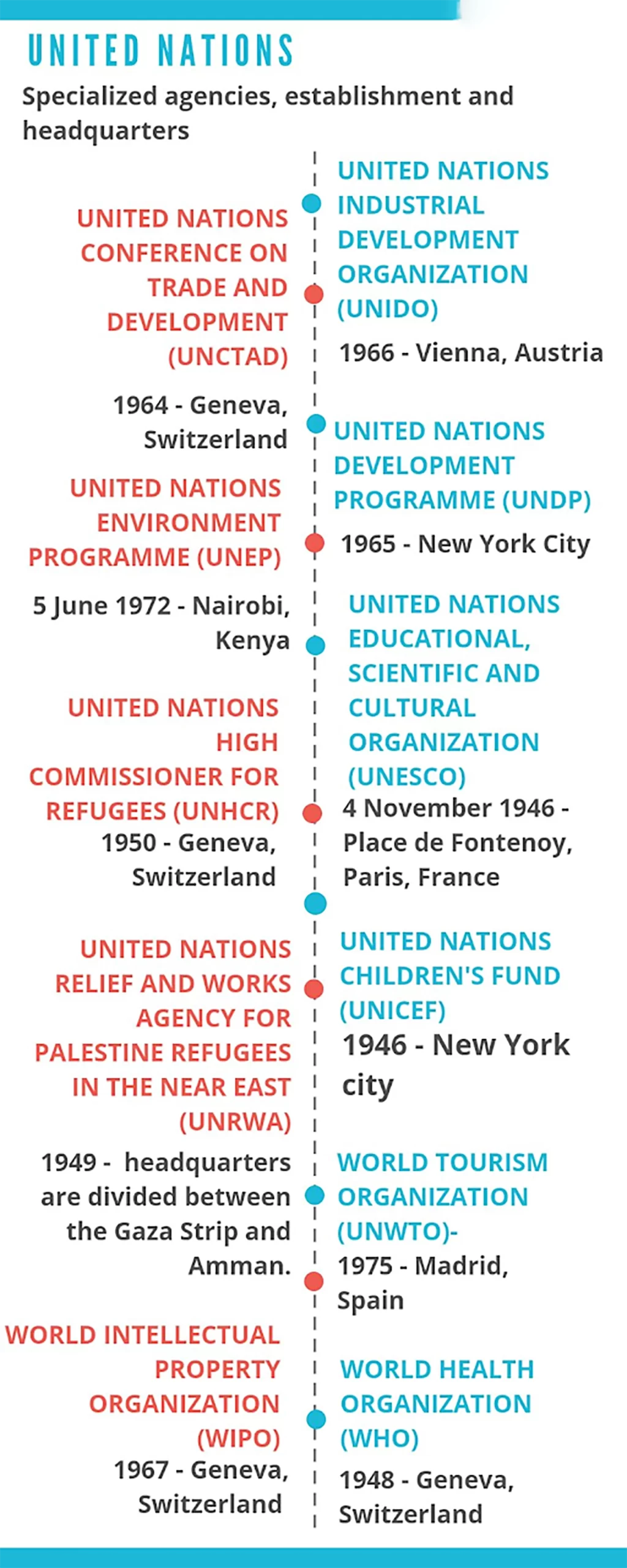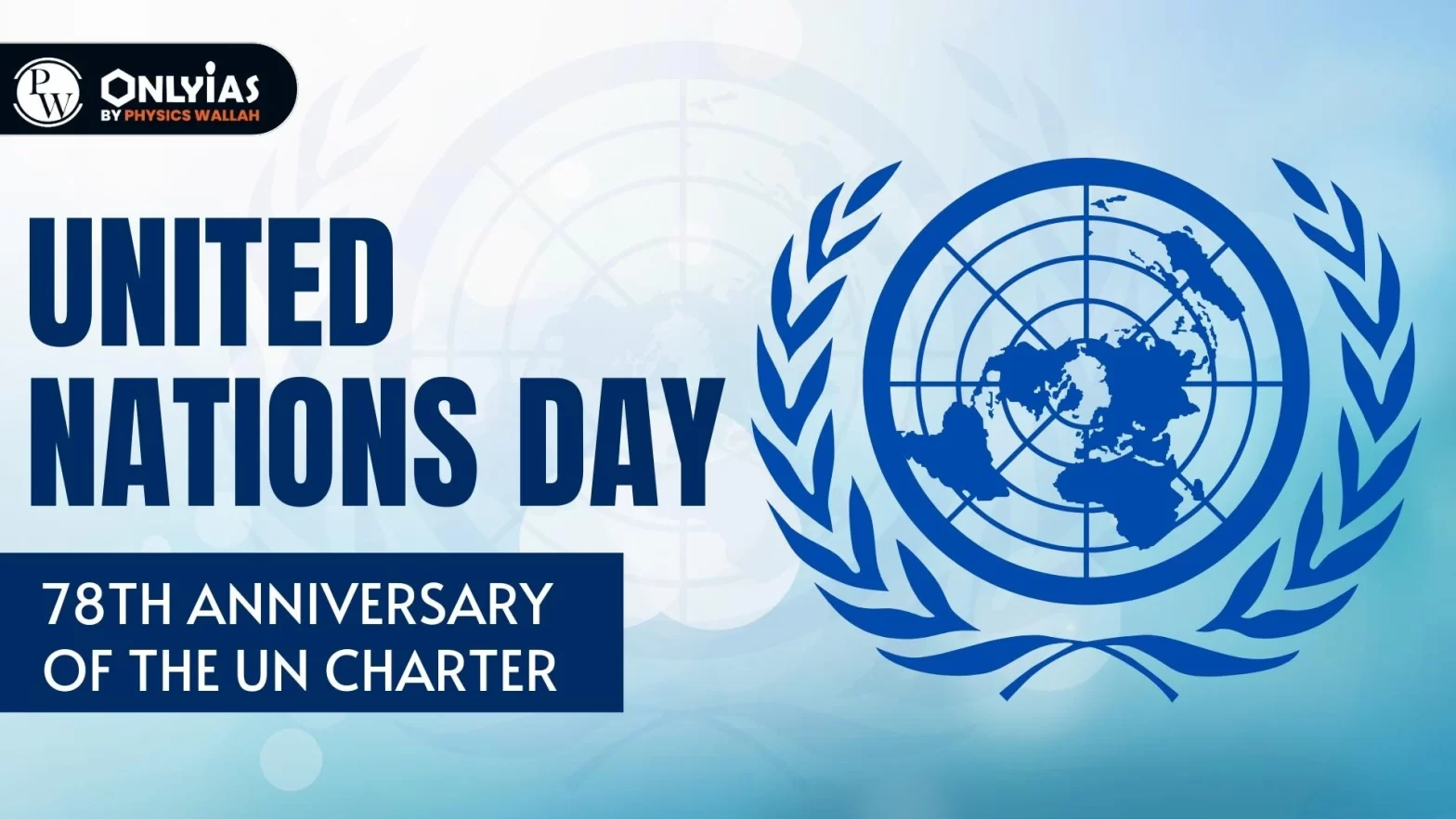Context:
| Relevancy for Prelims: United Nations Day, 78th anniversary of the United Nations, UN Charter, Important International institutions, Agencies and Fora, their Structure, Mandate.
Relevancy for Mains: Role of UN in Peacekeeping, its Achievements and Failures. |
United Nations Day: How was the United Nations formed?
- After the two World Wars ended there were two emerging new powers, in the form of the United States and the USSR, who looked set to rival each other.
- The UN was born out of the ashes of the League of Nations (created after World War I), it was primarily tasked with the goal of maintaining world peace.
- During World War 2, American President Franklin D. Roosevelt and British Prime Minister Winston Churchill held a secret meeting aboard naval ships in Placenta Bay and discussed the possibility of creating a body for international peace efforts.
- Together they issued the Atlantic Charter that paved the way for the creation of the UN.
- The United States joined the war in December 1941, and for the first time the term ‘United Nations’ was coined by President Roosevelt.
- On January 1, 1942, representatives of 26 allied nations met in Washington DC to sign the declaration of the United Nations, India was also among these nations.
- The United Nations finally came into existence on October 24, 1945, after being ratified by 51 nations, which included five permanent members (France, the Republic of China, the Soviet Union, the UK and the US) and 46 other signatories.
What are the four main goals of the United Nations?
- Maintaining International Peace and Security.
- Developing Friendly Relations Among Nations.
- Achieving International Cooperation in Solving International Problems.
- Being at the Center for harmonising the Actions of Nations.
What is the evolution of the United Nations?
- Membership: At the time of its formation, the UN consisted of only 51 member states. At present, 193 countries are members of the UN.
- Scope: It has also expanded its scope to cover a large number of global issues such as health, environment, women empowerment, among others.
- 1946: UN passed a resolution to commit to the elimination of nuclear weapons in 1946.
- 1948: It created the World Health Organisation (WHO) to deal with communicable diseases like smallpox, malaria, HIV.
- 1950: UN created the High Commissioner for Refugees which continues to be on the frontlines of crises faced by refugees from countries across the world.
- 1972: UN environment programme was created.
- 2002: UN established the UN criminal court to try those who have committed war crimes, genocide, and other atrocities.

Criticism of United Nations
- In 1994, the organisation failed to stop the Rwandan genocide.
- In 2005, UN peacekeeping missions were accused of sexual misconduct in the Republic of Congo, and similar allegations have also come from Cambodia and Haiti.
- In 2011, the UN peacekeeping mission in South Sudan was unsuccessful in eliminating the bloodshed caused by the civil war that broke out in 2015.
- Structure and other organisations associated with it, such as the World Bank and the IMF, have been criticized for furthering neo-liberal ideas related to championing free markets and a reduced role of governments.
- Further, the UN has been seen as unrepresentative of its members, particularly countries in the Global South.
Also read: UNSC Reforms For A New Era; What The World Thinks
Way Forward
- At a high-level meeting of the UN General Assembly in 2020, commemorating 75 years of the UN, a declaration was adopted that also set out its goals for the next 10 years, which have been designated as the decade of action and delivery for sustainable development.
- It is even more important as we build back better from the COVID-19 pandemic.
- The goals included protection of the planet and environment, promoting peace, gender equality and women empowerment, digital cooperation, and sustainable financing.
Conclusion:
On the 78th United Nations Day, reflecting on its genesis after World War II, the UN’s journey has been marked by achievements and critiques, emphasizing the ongoing need for collective global efforts towards a more inclusive, effective, and responsive United Nations.
| Prelims Question (2020)
Other than the Fundamental Rights, which of the following parts of the Constitution of India reflect/reflects the principles and provisions of the Universal Declaration of Human Rights (1948)?
1. Preamble
2. Directive Principles of State Policy
3. Fundamental Duties
Select the correct answer using the code given below:
(a) 1 and 2 only
(b) 2 only
(c) 1 and 3 only
(d) 1, 2 and 3
Ans: (d) |
![]() 25 Oct 2023
25 Oct 2023

